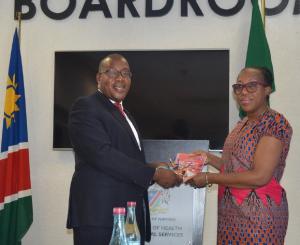Gearing towards a comprehensive health sector response for gender based violence
The Ministry of Health and Social Services with support from WHO and UNFPA adapted the Clinical Handbook for women subjected to intimate partner violence and/or sexual violence. The handbook will serve as a stepping stone for transforming the health sector to provide a comprehensive response to survivors of gender based violence. The adaptation process involved consultation with health care providers, social workers, police officers and civil society organizations.
The Executive Director of the Ministry of Health and Social Services, Mr. Ben Nangombe, launched the handbook on 24 April 2019. In his statement, the ED said that the health sector is a key partner in the prevention of, early intervention and response to gender based violence. Survivors who have been abused or assaulted need care and support. Health-Care Providers may be the first people in whom a survivor confides and speak about the violation they experienced. The health sector is thus, in most cases, an entry point to formal service provision.
Speaking on behalf of WHO and UNFPA, Mrs. Denia Gayle, UNFPA Representative, said that the Clinical handbook aims to strengthen the health sector response to violence against women and provide specific evidence-based guidance that can help to strengthen the way health-care providers respond to women who have experienced violence. It stresses the importance of incorporating issues of violence into clinical training curricula, strengthening health systems to support women through direct services and multi-sectoral responses. It also serves to identify key entry points, such as sexual and reproductive health services and mental health services for addressing violence, and scaling up appropriate post-rape care responses.
Violence against women and children in Namibia remains a key public health concern. Globally 30% of women have experienced physical and/or sexual violence by an intimate partner. Within the WHO Africa Region the prevalence of physical and sexual violence against women and girls by an intimate partner is as high as 36.6%. The last (2013) Demographic Health Survey reported that , 33 percent of ever-married women age 15-49 report ever having experienced physical, sexual, and/or emotional violence from their spouse, and 28 percent report having experienced such violence in the past 12 months prior the survey. Among ever-married women who had experienced spousal physical violence in the past 12 months prior the survey, 36 percent reported experiencing physical injuries. Six percent of women reported experiencing violence during pregnancy.
WHO and UNFPA will continue to support the Ministry in training a team of trainers and pilot the implementation of the handbook at selected health facilities.



